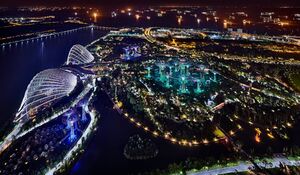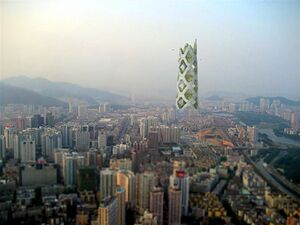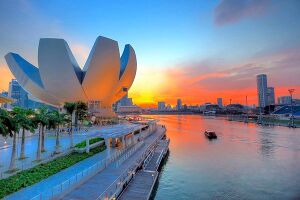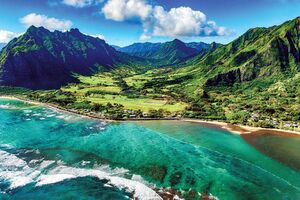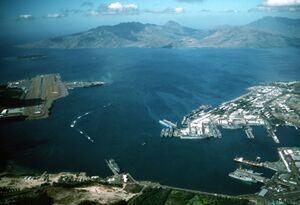User:Apuni: Difference between revisions
(→Kaha) |
|||
| Line 204: | Line 204: | ||
Nanaluki is known for its exteremly high end entertainment and tourist industry. | Nanaluki is known for its exteremly high end entertainment and tourist industry. | ||
Kaha | |||
An "accidental" banking hub, Kaha has been a focus of international banking, a reservoir for "off-shore" accounts, and very discrete financial services. | An "accidental" banking hub, Kaha has been a focus of international banking, a reservoir for "off-shore" accounts, and very discrete financial services. | ||
Revision as of 21:35, 30 September 2023
The Dominion of Apuni Apuni | |
|---|---|
|
Flag | |
| Map of Apuni Map of Apuni | |
| Capital | Kailua |
| Demonym(s) | Apunian |
| Government | Republic |
| Hui Nui | |
| Hui Kanaka | |
| Population | |
• Estimate | 14,710,000 |
| Currency | Shells |
This article is incomplete because it is pending further input from participants, or it is a work-in-progress by one author. Please comment on this article's talk page to share your input, comments and questions. Note: To contribute to this article, you may need to seek help from the author(s) of this page. |
Apuni is a country on Eurth.
(Introduction to the Dominion)
Geography
As a sprawling tropical archipelago, the Dominion of Apuni is characterized by its volcanic origins, lush tropical vegetation, beautiful beaches, and diverse landscapes. Specifically, the Dominion includes volcanoes, including some of the most active on Eurth, the Pele Mauna and the Lani Mo’i. The volcanoes have shaped the landscape, creating dramatic cliffs, dramatic lava fields, and very fertile soil. The Apuni enjoy a mild tropical climate, and consistent temperatures throughout the year. Coastal areas experience warm temperatures, while higher elevations can be cooler. The island are also influenced by trade winds which bring refreshing breezes and moderate humidity.
Waimanalo
Primary City: Kailua (Capital of the Dominion)
The capital city of Kailua is the largest city in the Dominion and its seat of government.
Pokai (Gambling and tourism center)
The northern city of Pokai is well known for its indiscriminate gambling (e.g., you can place wagers on just about anything you can imagine), and a center for mid-to-high level tourism.
Paia (Expanded tourist enclave)
Located on the southern part of Waimanalo, Paia has extensive resorts and hotels to accommodate the influx of tourist from Eurth.
Mokulau
Primary City: Nanaluki
Nanaluki is known for its exteremly high end entertainment and tourist industry.
Kaha An "accidental" banking hub, Kaha has been a focus of international banking, a reservoir for "off-shore" accounts, and very discrete financial services.
Kaneapua
Primary City: Pahoa
Pahoa has often been called the "Military's hub", due to the extensive military nautial ports, aerodromes, and support services (including military contractors).
Kapa'a
Kuloa
Punalu'u
Primary City: Ha'ena
Ka'ena
Waikapu
Aki
Primary City: Malaekahana
Awa Palekana
One of the two most distant islands under Dominion control the Awa Palekana ("Safe Harbor"), is a Dominion military facility used for nautical serarch and rescue, escort, and anti-piracy operations in the Southern Meterolas and Safijerian Sea. Due to stubborn piracy problems, the Deep Fleet provides two services to mercantile entities, convoy escorts through the Safijerian Sea to Marenesia, Marenesia Minor, and the Nusaetara Island Chain, and pro-active piracy neutralization ("pirate hunting"). Due to endemic poverty in the numerous island chains of the Safijerian Sea, high-seas piracy of merchant vessels has become a lucrative market. The Dominion Deep Navy works diligently with other political partners to counter this international problem.
Pele Mauna - Volcanic Island Chain
(WIP)
.
History
(WIP)
The Dominion of Apuni is a relatively new political entity, establishing its independence approximately sixty years ago. Originally a very loose confederation of small independent cities-states and suzerains, it was infamous as a haven for piracy for decades. Over time, and with the modernization of Eurth navies, piracy in the local island chain abated and the Apuni island chain devolved into an economic vassal of neighboring states. Seizing upon an opportunity during the late 1930s, the islands to consolidated into the current Dominion. Although the Apuni have faced numerous challenges to its sovereignty, it is a small but emerging nation on Eurth.
???? - 1930 - WIP
Late-1930s through mid-1940s - Emigration of corporate entities and refugees from the Kingdom of Bainbridge Island (KBI) during it's devastating seven-year civil war. Either fleeing communist oppression or seeking to escape that faction's forcible "nationalization" of its assets, a substantial portion of industry, academia, and eastern populace of the KBI relocated to the relatively unoccupied southeastern end of the Southern Meteorolas.
1943 - Founding of the Dominion - After substantial negotiations between relocated industry, financiers, and local political entities, the Dominion of the Apuni was established.
1940 - 1950 - The Barramundi era (Consolidation and development of the Dominion and efforts to quickly and efficiently consolidate the island chain into a political entity begin.)
1950 - 1960 - The Anglefish era (Emergence of the Apunian Economy - Rapid development of numerous branches of the Dominion's economy as it began to reach out to the rest of Eurth.)
1960 - 1970 - The Conus era (The Quiet War with the KBI a conflict initiated by the KBI to integrate the Dominion into the Kingdom.)
1970 - 1980 - The Sundial era (Strengthened after success in the Quiet War, the Dominion begins to develop significant infrastructure projects to support business, intelligence, and military.)
1980 - 1990 - The Betta era (The "Troubles" with the KBI - Ongoing conflict with the KBI due to growing interference by the Royal Navy into Dominion sovergnity.)
1990 - 2000 - The Koi era (Further relaxing of Apunian banking laws encourage significant emigration to the Dominion, in turn boosting its economy.)
2000 - 2010 - The Arowana era (The Dominion government forced to address structural and social issues affecting the Dominion.)
2010 - 2020 - New Economic Horizon (Heavy investment into emerging technological industries supported by both major parties, "Short term pain for long term gain"; Greater integration into the international community.)
2020 + - Current day
Governance
(WIP)
The Dominion is a democratic federation, consisting of a legislative, executive, and judicial branches. The Dominion's legislative branch is bi-cameral, consisting of two chambers, the lower chamber known as the "Hui Kanaha" (the People's Assembly) and the upper chamber known as the "Hui Nui" (the "Chiefs' Council").
Legislative Branch
The Hui Kahana is elected based on a proportional representation system. Every five years, each citizen votes on candidates from the competing political parties and the outcome determines the number of junior representatives of each district. The Huk Kahana total representation is adjusted periodically to ensure it remains proportional to the population. The Kahana is responsible for drafting and passing legislation related to national policies, budgets, and other matters which affect the entire nation. They serve a fixed term of four years, staggered for re-election every two years. The Hui Nui is composed of senior representatives who are elected by each of the Dominion's territories (also known as administrative regions), regardless of population. The Nui focuses on maters related to individual territories, including local governance, territorial management, and regional development. They also play a significant role in reviewing and amending legislation proposed by the Hui Kahana.
Executive Branch
The Apunian head of state is the "Chief Executive".
Judicial Branch
The Judicial branch is known as the "Judges' Bench" (or just the "Bench"), which are responsible for interpreting and applying Dominion law. The judiciary is composed of lower courts throughout Apuni.
Politics
(WIP)
The Dominion has six notable political parties, with two primary parties and four minor parties.
The Mercantilist Party
(The centrist-conservative party)
The New Horizon Party
(The centrist-liberal party)
The Sacred Land Party
Otherwise known as the Ecology party, the Kaiola places an emphasis on stewardship of the natural environment of the Dominion.
The Kala Party
Translated as the "money" party, this group focuses mainly on aggressive development of business interests within and outside of the Dominion. This party is well-funded by business interests, but have a somewhat questionable reputation.
The Reformist Party
(The Far-left Party)
The Haipule
(The "religous right" party)
Economy
(WIP)
The Dominion of Apuni currently has a thriving, multi-faceted economy, including:
Industries
Tourism and Gambling
The Dominion's natural beauty, white sand beaches, and vibrant culture have made it a popular tourist destination. The tourism sector complements its lucrative gambling industry by providing jobs and revenue from visitors.
Banking and Financial Services
Apuni has a thriving financial services sector which compliments its stringent banking laws and offshore accounts, contributing to its economic prosperity.
Information Technology
Apuni is known for its cutting-edge technology sector, with a focus on software development, data analytics, and cybersecurity. The Dominion has attracted tech companies, entrepreneurs, and innovators from around the world due to its favorable business environment and talented workforce.
Maritime Trade and Logistics
Situated strategically at the crossroads of major shipping routes, Apuni boasts a busy ports and a well-developed logistics infrastructure. The Dominion is a global hub for trade and servers as a transshipment point for goods travelling between continents, contributing significantly to its economy.
Sustainable Aquatic Agriculture
The Apuni have invested heavily in sustainable aquatic agriculture, specializing in the culvation of seaweed, oysters, and other marine delicacies. Using eco-friendly and responsible farming practices, the island has become a leader in maritime agriculture, supplying both domestic and international markets.
Specialty Agricultural Products
Economic Policies
Low Taxation
Sustainability Initiatives
Infrastructure Development
International Trade Partnerships
Military
(WIP)
As an island chain, the Dominion places a substantial focus on its naval forces. As it's largest armed entity, it consists of disparate branches, each with its own unique focus.
(Provides primary defense for the territorial islands of the Dominion.)
(Works to ensure safe passage for merchant vessels within Dominion seaways and extending to peripheral waterways.)
Ecological Corps
(The branch focused on maintaining ecological security and enforcing ecological regulations and integrity.)
The Dominion Marines
(The ground forces of the Dominion, which focus on jungle & island warfare, including sea-to-shore assaults.)
The Dominion Air Corps
(The aero branch of the Dominion, frequently working in concert with the other two branches of the Dominion military.)
Cultures
(WIP) The ethnicity of Apuni’s population is primarily of Polynesian descent, but with mixed races (Polynesian/Haole (aka Caucasian)/Oriental) comprising approximatly just over 50% of the population. The remaining half of the population is either of Haole (18%), Oriental (17%), or native Polynesian backgrounds (13%).
Although the primary culture is also Polynesian, there are significant influences from Haole and Oriental cultures. Additionally, the democratic and libertarian aspects of their piracy background are evident as part of the Apunian culture. Most Apunians are known to be trade-inclined, enjoy haggling and notoriously thrifty and frugal.


